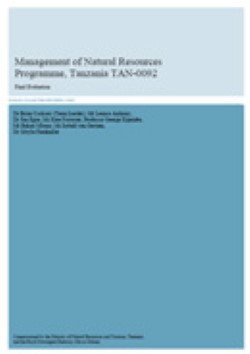Management of Natural Resources Programme, Tanzania TAN-0092 : Final Evaluation
Om publikasjonen
- Utgitt: mai 2007
- Serie: Norad-innsamlede rapporter
- Type: --
- Utført av: Brian Cooksey (Team Leader), Leonce Anthony, Jim Egoe, Kate Forrester, George Kajembe, Bakari Mbano, Isabell von Oertzen, Sibylle Riedmiller
- Bestilt av: Ministry of Natural Resources and Tourism, Tanzania and Royal Norwegian Embassy, Dar es Salaam
- Land: Tanzania
- Tema: Styresett og demokrati, Naturressurser (inkludert olje), Primærnæring (landbruk fiske skogbruk)
- Antall sider: 188
- Serienummer: 1/2007
- ISBN: 978-82-7548-188-5
- ISSN: --
- Prosjektnummer: TAN-0092

Contents
Volume 1: Main Report. Summary of Main Findings and Recommendations
Volume 2: Findings from Field Visits
Volume 3: Annexes
The Project
The Ministry of Natural Resources and Tourism in Tanzania, through its Management of Natural Resources Programme (MNRP) has been supported by Norway since 1994 with a total budget of around NOK 300 million. MNRP consists of 11 projects within three areas: Forestry and forestry research (6 projects); Wildlife and wildlife research (4 projects); Marine (1 project). The MNRP's main objective is: Increased benefits to rural communities based on sustainable natural management in Tanzania.
Interesting Findings
• MNRP can claim some success with regard to achievements of its objectives, notably in the area of natural resource conservation and restoration (dynamite fishing at Mafia Island Marine Park has stopped and some catchment forests conserved). MNRP has also contributed to increased income generation and poverty reduction among community members in project areas.
• The project has had some negative, unintended, effects, notably that projects sometimes have achieved their conservation objectives at the expense of, or with unforeseen negative consequences for, local populations.
• In general, project benefits are frequently limited to a relatively small number of communities and households. It is difficult to assess the geographical spread and poverty reduction impact of these benefits.
• The financial management of MNRP is not very transparent and there is evidence that the taxes, royalties and fees collected from natural resource management (NRM) related activities accrue to central and local governments, with insignificant amounts left for village communities.
• Consequently the team has major concerns over the extent and distribution of environmental and socio-economic benefits derived from the programme and therefore over the efficiency and long-term effectiveness and sustainability of MNRP interventions. The long time goal of NRM support should be to make the Government of Tanzania financially independent of donor aid by valuing and taxing natural resources effectively and enforcing NRM laws and regulations.
• There are important challenges that must be attended to in future collaboration, notably: Governance shortcomings on both Norwegian and Tanzanian side that serve to undermine community empowerment and the implementation of participatory NRM policies; Multiple donors and weak internal and external aid coordination capacities; weak policy implementation and service delivery capacity at the local level; failure to integrate NRM into government and aid-supported macro-economic, fiscal, budgetary, and poverty reduction policies.
• The evaluation was framed to be part of the planning of a new programme of management of natural resources in Tanzania and is thus part of a comprehensive process of follow-up and planning by the Norwegian Embassy in Dar es Salaam with Government and other partners. The mandate for this planning has placed the natural resources in a broader social perspective as well as good governance.
